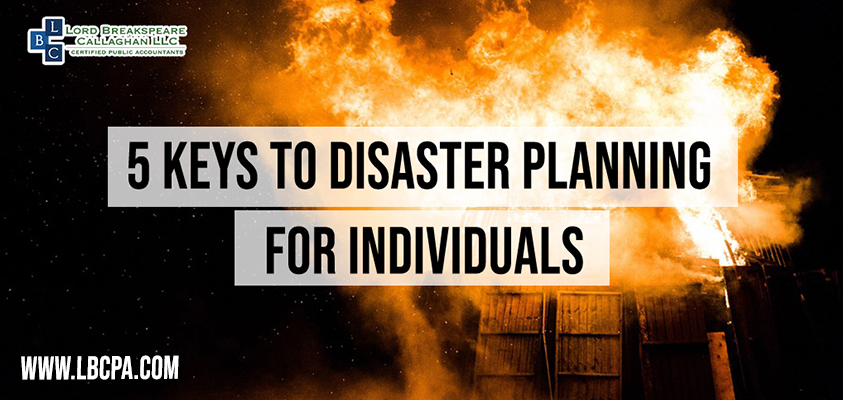LBCPA News 
Click here to go back
— 5 KEYS TO DISASTER PLANNING FOR INDIVIDUALS

Disaster planning is usually associated with businesses. But individuals need to prepare for worst-case scenarios, as well. Unfortunately, the topic can seem a little overwhelming. To help simplify matters, here are five keys to disaster planning that everyone should consider:
1. Insurance. Start with your homeowners’ coverage. Make sure your policy covers flood, wind and other damage possible in your region and that its dollar amount is adequate to cover replacement costs. Also review your life and disability insurance.
2. Asset documentation. Create a list of your bank accounts, titles, deeds, mortgages, home equity loans, investments and tax records. Inventory physical assets not only in writing (including brand names and model and serial numbers), but also by photographing or videoing them.
3. Document storage. Keep copies of financial and personal documents somewhere other than your home, such as a safe deposit box or the distant home of a trusted friend or relative. Also consider “cloud computing” — storing digital files with a secure Web-based provider.
4. Cash. You may not receive insurance money right away. A good rule of thumb is to set aside three to six months’ worth of living expenses in a savings or money market account. Also maintain a cash reserve in your home in a durable, fireproof safe.
5. An emergency plan. Establish a family emergency plan that includes evacuation routes, methods of getting in touch and a safe place to meet. Because a disaster might require you to stay in your home, stock a supply kit with water, nonperishable food, batteries and a first aid kit.
If you have any questions regarding accounting, domestic taxation, international taxation, IRS representation, U.S. tax implications of Real Estate transactions or financial statements, please give us a call at 305-274-5811.
Source: Thomson Reuters






